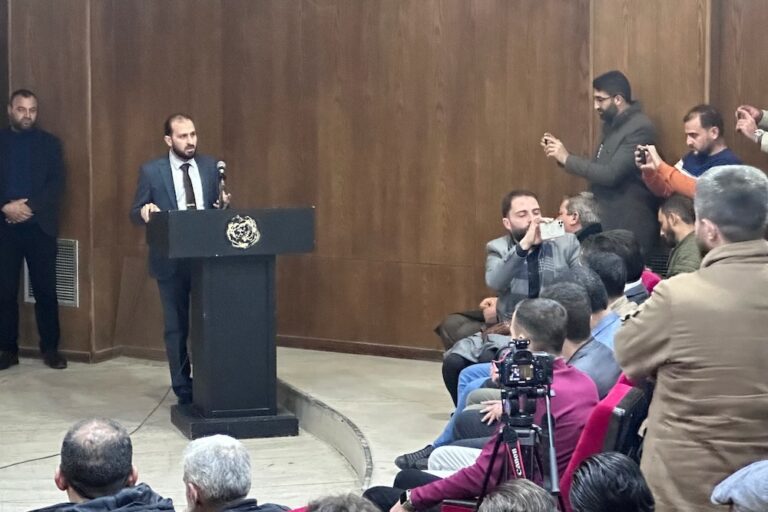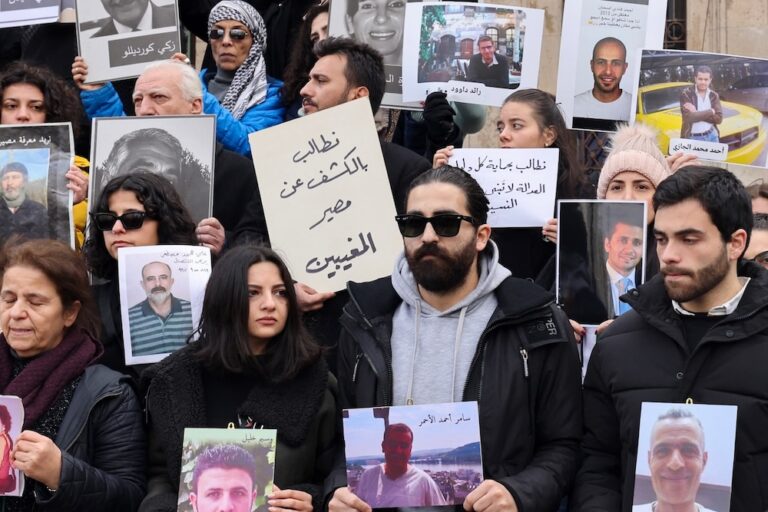(RSF/IFEX) – The following is an RSF press release: Nizar Nayyouf released but put under house arrest The journalist continues his hunger strike Journalist Nizar Nayyouf was released on 6 May 2001 in the night, announced his family to Reporters Sans Frontières (RSF – Reporters Without Borders). This release happened after nine years in detention […]
(RSF/IFEX) – The following is an RSF press release:
Nizar Nayyouf released but put under house arrest
The journalist continues his hunger strike
Journalist Nizar Nayyouf was released on 6 May 2001 in the night, announced his family to Reporters Sans Frontières (RSF – Reporters Without Borders). This release happened after nine years in detention and only one year before the end of his sentence. Accompanied by policemen, the journalist was taken to his house in the coastal city of Lattaquia where he was put under house arrest.
Reporters Sans Frontières is naturally very pleased about this release but regrets first that it did not happen sooner, and secondly that it is accompanied by restrictions which limit the journalist’s freedom. According to his family, the Syrian authorities said that Nizar Nayyouf will not be allowed to leave the territory and that his movments will be controlled. No official document about his release has been supplied to the journalist to date. To protest against these measures, the journalist decided to continue his hunger strike, started on 24 April. He is today in an extremely weak state.
RSF has asked the Syrian autorities to lift all the restrictions so that the journalist may have total freedom. Contacted by telephone, Nizar Nayyouf expressed his wish to leave the country so that he can be treated in a foreign country. “I would like to be hospitalised in France or Germany,” he said. The organisation asks for the release of the last journalist detained in Syria, ‘Adel Isma’il.
During his nine years in prison, Nizar Nayyouf never received appropriate medical care. According to his family, he suffers from a lymphoma (a malignant tumour of the glands) and from the after-effects of torture to which he was subjected during his detention. His lower limbs are paralysed because of fractured vertebrae due to torture, particularly being crucified upside down and struck with iron bars. Today, he cannot walk without crutches.
Nizar Nayyouf, journalist with the monthly Sawt el Demokratia, contributor to the magazines Al-Hurriya and Al-Ma’arifa and member of the human rights organisation, the CDF – Committee for the Defense of Democratic Freedom and Human Rights in Syria (an organisation banned by the government) was arrested in 1992. He was sentenced to ten years’ imprisonment and deprival of civil rights for having written a leaflet detailing the irregularities during the 1991 presidential elections and the violations of human rights which accompanied them.
‘Adel Isma’il, journalist with the Lebanese daily Al Raïa, was arrested in 1996. Accused of being an activist with the banned Democratic Baath Party, he was sentenced to ten years’ imprisonment.


